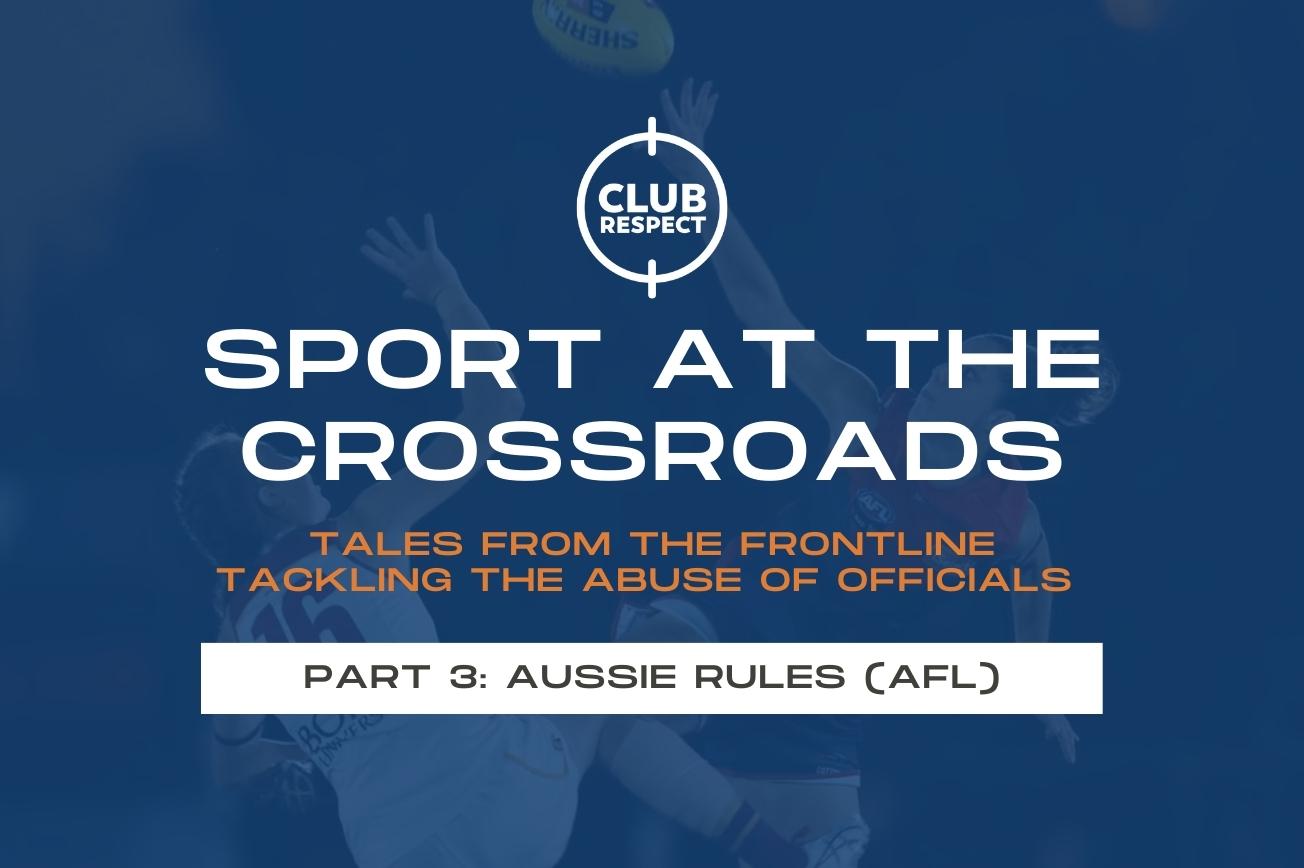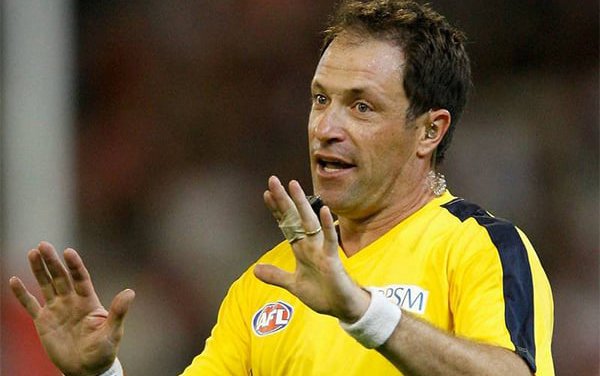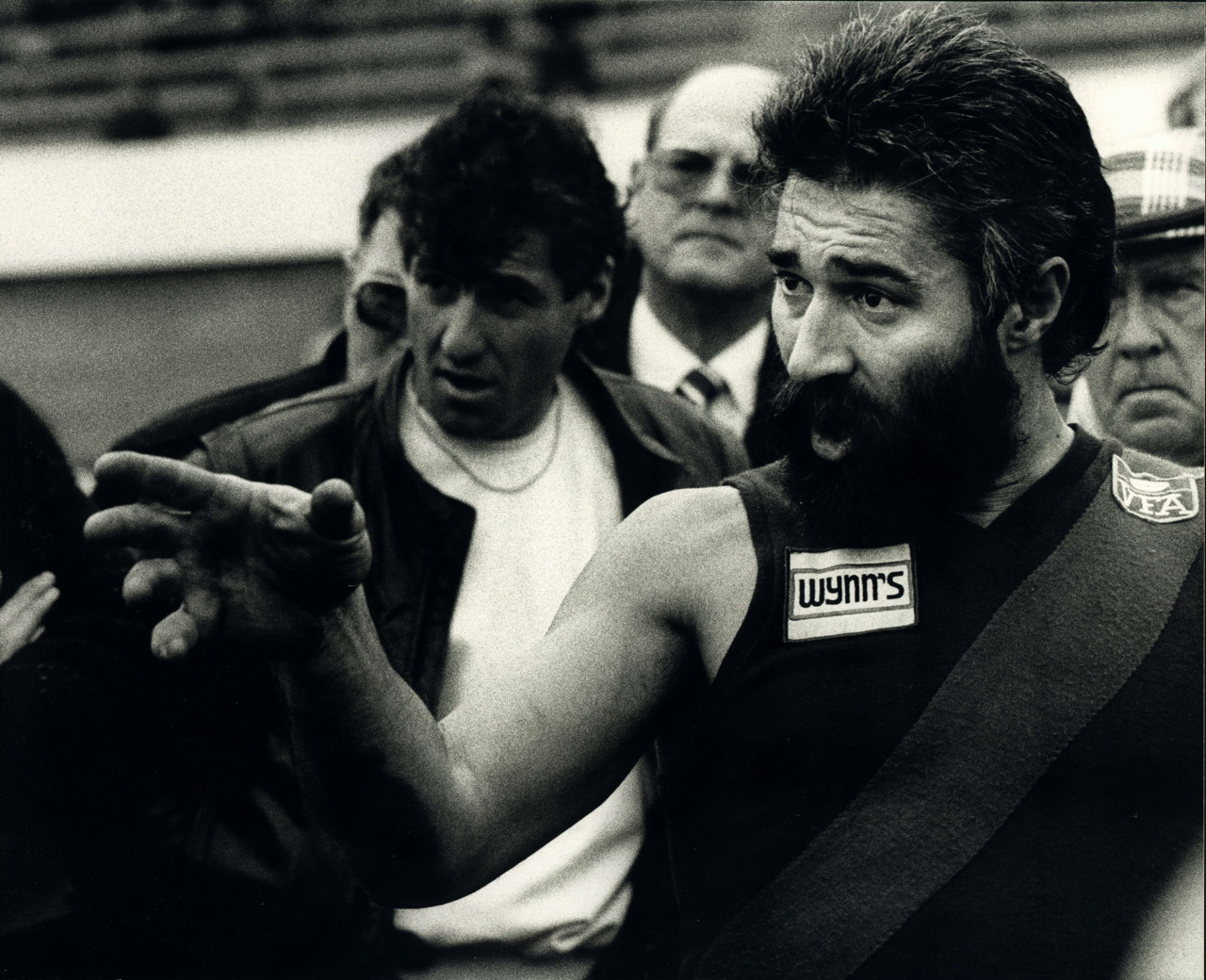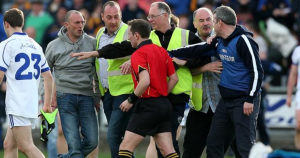Sport at the crossroads: Aussie Rules' (AFL) path to respect

This is Part 3 of our ‘Sport at the crossroads’ series, exploring the way different sports codes and associations are tackling the abuse of officials.
Part 1: Football (Soccer)
Part 2: Rugby League
Part 3: Aussie Rules (AFL)
Part 4: Netball
Part 5: Rugby Union
Part 6: Basketball
Part 7: Cricket
Tales from the frontline tackling the abuse of officials – Aussie Rules (AFL)
When GWS Giants dynamo Toby Greene bumped into Umpire Matt Stevic in the 2021 elimination final against the Sydney Swans, he could not have known the furore and debate it would trigger.
The incident was an unintended litmus test for the AFL – would they stand by their sacred position that umpires are to be protected from any physical abuse?
Or would the old heads win the day, citing ‘passion’, the need to ‘man up’ and the fact that critics that hadn’t played at AFL level so couldn’t possibly understand a heat of the moment action?
Umpire Stevic noted solemnly in his evidence: “To be honest I don’t think it’s a good look for the game. There’s an element of it that is disrespectful.”
The resulting three-week suspension handed down by a tribunal of ex-players was lighter than expected, with AFL CEO Gillon McLachlan personally intervening to attempt to secure a longer suspension.
McLachlan shared his fears on the message it would send to the lower tiers: “As the CEO of the league, I’m saying to the community leagues and others that I find that decision perplexing.
Even at a minimal suspension length of three weeks, the admitted “brain fade” did rule out a major star from the finals, denying GWS fans their two-time All-Australian, so it did have a greater impact than a regular season suspension.
However, the AFL’s Senior Counsel Jeff Gleeson was having nothing of Greene’s “accidental” defence describing the incident as a “bar room act” “insolent, contemptuous, aggressive, demonstrative and disrespectful.”
Gleeson added: “Umpires are untouchable. It’s fundamental to our game the umpire is respected, that his or her decision is respected and physical presence is respected. Nothing is more important. The game collapses & changes in its nature if we don’t adhere to this fundamental principle. Umpires are untouchable.”
**
The ABC’s head of Sport Paul Kennedy wrote a strong story about the Greene suspension, which he noted “lands a blow” for umpires who he feels are under a constant siege:
“The tribunal’s banishment of Greene for 2021 was necessary to stand up for trusted officials. Anyone involved in community-level football will tell you Australian rules is experiencing an umpire shortage and as a result those who take up the whistle are being asked to do multiple games every weekend.”
For Kennedy there are a few likely explanations for the shortfall in community umpires: “Perhaps those who were umpiring to make a few bucks got sick of the (Covid) uncertainty, or maybe they found they enjoyed not being criticised on Saturday afternoons.”
“Whatever the reason, there is a growing gap between ‘registered umpires’ and ‘required umpires’ and in my lifetime in football, I’ve never seen it so dire.”
Kennedy acknowledged the impact on abuse on the dreaded one year umpire drop off phenomena: “There is always the abuse from sooks in the outer, and it makes sense that dropout rates are highest among umpires after just one season on the job.”
“It might make us all think a bit more about the way we treat umpires in our moments of frustration, for the recruitment and retention of these men and women have never been more critical.”
**
Umpires may be ‘untouchable’ according to Senior Counsel Jeff Gleeson’s theory, but in practice, 2021 has seen a spate of umpire abuse across the nation in Australian Rules Football.
In Ocean Grove in the Geelong region, a 19-year-old female umpire was allegedly subjected to sexist abuse and followed home after a practice game.
In Adelaide, the Advertiser has called umpire abuse by players in 2021 “the worst it’s ever been and it’s getting worse” after a record number of player suspensions. Also, in shocking scenes, a 14-year-old boundary umpire was assaulted by parents at an Edwardstown junior girls match.
Coaches have also been abusive of umpires and Adelaide Footy League chief executive John Kernahan declared he has no tolerance for coaches who behave like umpiring experts on the sidelines but refuse to attend umpiring seminars.
“Coaches who ignored an invitation at the start of the season to participate in an umpire education forum and yet are keen to argue to the league about umpiring on a Monday are wanting their cake and eating it too.” Kernahan told InDaily.
In regional South Australia, the Riverland Football League (RFL) has launched a major crackdown on crowd abuse in response to its pool of umpires reaching an all time low and is finding major challenges recruiting umpires to replace the older ones.
For RFL Chair Mark Wright, 2021 has been a step backwards after some solid years of progress and said of the abuse: “There’s been a bit of it creep back in this year after a year off.”
The Western Australian Goldfields Football League continued its poor history of umpire abuse when former AFL-listed player Daniel Murray was banned for life after punching an umpire and putting him in a headlock. It was his second serious offence against an umpire.
Head of AFL Tasmania Damian Gill spoke after umpire abuse at a Coastal junior match saying: “There is simply no place in our game for umpire abuse, it frustrates me that people think it is okay to abuse umpires at the footy. Abuse of umpires must stop.”
At the elite level, Greater Western Sydney football manager Jason McCartney approached the umpires at halftime in a game and abused their performance, an incident that was beamed to the nation and earned him a $20,000 fine.
AFL football operations boss Steve Hocking noted the downstream impact of McCartney’s behaviour. “We can never underestimate the impact of the actions of those at AFL level on all levels of the game,”
And spare a thought for poor old former umpire Michael Vozzo who retired from the AFL ten years ago and is still dealing with a disgruntled fan who stalks him on Facebook.

Former AFL Umpire Michael Vozzo
**
Do these incidents add up to a crisis or are they outliers and a small minority in proportion to mostly respectful treatment of umpires.
To get a first-hand view we head out to Melbourne’s Eastern Football Netball League to hear from 25-year-old Alexa Sakkal who has been an umpire for 6 years. She has been moving up the ranks and increasing her confidence and was about to debut in the third division senior men’s competition before the pandemic struck.
For Alexa, umpiring has been an overwhelmingly positive experience: “I’ve developed confidence, belief in myself, strength, determination and resilience. I’ve grown a lot as a person.”
Her experience and methods of handling abuse have changed over the years as her confidence has increased: “When I was younger, if players abused me I would take it on the chin and pretend I didn’t hear it and believe what they were saying to me – that I’m an idiot or dumb. I remember one guy telling me he needs to re-educate me.”
Other players will reference her gender but she hasn’t felt she has been treated any worse than the men: “I’ve been called sweetheart, darling – they’re condescending but better than swear words. If I’m umpiring with a guy he gets treated exactly the same as me – we both get called horrible things. Sometimes I get treated better as well.”
The acquisition of experience and confidence has helped Alexa undergo a complete personal transformation in handling abuse: “I’ve learned a lot so I’ll pay a free kick straight away when there is abuse. I don’t take crap any more.”
For Alexa, respect is a two-way street: “I feel it’s important to show the kids at junior level what you can and can’t do along with the men and women in the higher levels who need to be told they can’t disrespect umpires and need to be good role models. Because it trickles both ways, up and down. We don’t go out on a Saturday and Sunday to be abused.”
Umpires around the country watched the Toby Greene incident with great interest and Alexa viewed the suspension as positive support: “I feel like the Toby Greene suspension sent a strong message of what you can and can’t do because the local leagues are essentially puppets and we copy everything the AFL does. A strong stance from the top trickles down to us – whether its abuse, dangerous tackles, racism or concussion”.
Alexa has also volunteered to work on the Victorian Amateur Football Association’s disciplinary tribunal and leverage the skills developed in her day job as a legal analyst: “It allows me to merge my passion for sport with the law – having the legal background and being an umpire allows me to bring different perspectives to the table. A lot of the tribunal members are barristers and lawyers and I have learned a lot from them.”
Recruitment of umpires is an eternal challenge for the game at Alexa’s level: “We’ve had huge churn, especially with the pandemic and leagues have been sharing umpires. It’s the young umpires that last a season and leave that is the problem. They don’t make it over the hump. But I continued to ride the wave until I reached that point of confidence but for me it did take a while. ”
Empathy from players and spectators remains elusive and Alexa is a big believer in player education. As a fan of the sport, she understands that things can be said during a tough game but is very appreciative when an apology is forthcoming:
“I’ve been sworn at by a frustrated player and afterwards they’ve said sorry and it’s amazing what a difference that makes. I understand that we all love the game and are passionate about it and sometimes it gets tense. But don’t take it out on us. We’re only trying to help and without us, it would be a nightmare.”

New breed of Umpires (Alexa Sakkal third from the left)
**
For the fans online, the issue of umpire abuse is highly polarising. In various Reddit forums, the temperature is raised very quickly on both sides when umpiring is raised. There is talk of skeleton crews, umpire strikes, umpires shared across leagues and some umpires doing 5 matches on a weekend.
Some feel that the decline of umpires is an absolute crisis that has reached “ridiculous heights” and have grave concerns for the future of the game.
Others blame “excessive tinkering” of the rules and interpretations that confuses fans which leads umpires to second guess themselves in split-second decisions, impacting their confidence.
For some, the lack of umpiring capability is the primary cause of abuse whilst for many, there is a ‘blame culture’ in which the players can make many mistakes in the game but umpires are not afforded the same luxury to make mistakes, learn and grow.
**
Is verbal abuse the leading cause of the decline in umpire numbers?
According to Andrew Talbot who is responsible for AFL’s umpiring growth and development in Victoria, there are other more critical societal factors at play.
Removing emotion aside says Talbot, the research his team collects tells a more holistic story: “The outside perspective is that abuse and poor match day behaviour is impacting umpire growth and retention but it is actually a small factor.”
He doesn’t deny the problem but feels umpire abuse needs to be placed into the wider perspective: “I’m not saying it’s not a factor and it still happens – we have had more reports this year than previous years and we definitely want to cut out as much as we can. But the data says it’s not the main reason people don’t return to officiating.”
And what does the AFL’s research conclude is the primary factor?
It is lifestyle change according to Talbot: “The main factors are study, work and family that change a person’s perception of whether they want to umpire or not. A lot of umpires give it up due to change – high school to uni, uni to full-time work or choosing to have a family.”
Importantly for Talbot, there has been some positive change regarding abuse of umpires: “Ten years ago when you went to the football, you were expected to shout at the umpire and there is still a bit of cultural acceptance of the abuse. But the severity has definitely reduced in the last 5 years and fans, players and coaches are more aware of not stepping over the line and making it a personal attack. It’s called out a lot more now which is a good thing and we need more people to call it out.”
The positive change has been underpinned by the AFL calling out all forms of anti social behaviour: “Whether its increasing diversity and inclusion or cracking down on racism, sexism and abuse, it all helps” says Talbot. “The overall increase in respect is starting to shift into officiating as well.”
Would Talbot consider the umpire situation a crisis?
“I wouldn’t say it’s a crisis. We had more umpires than ever in 2019 before the pandemic and we’re down 6% in 2021 after a year of no football, which is a lot better than most people were expecting. It’s not ideal because we’re always going to want more umpires and it needs a lot of work. But as we return from Covid and people are confident that there will be some consistent football, we might get some good numbers back.”
A key ingredient for success in umpire growth for AFL Victoria involves increasing empathy for the role through the Junior Club Engagement Program which engages football clubs in umpire recruitment.
The program is best practice and adopted after following a successful program implementation in AFL NSW/ACT. It is elegantly simple and calls on clubs to utilise their junior players to umpire other junior matches.
This is a gamechanger according to Talbot: “It normalises umpiring within a football club and starts to adjust match day behaviour because parents on the sideline know that little Johnny in the middle is Susie’s son and a member of the club. This reduces the social acceptance of abusing an umpire and we’re trying to roll that out in Victoria. It’s a catalyst in changing match day behaviour and we’re hoping will also boost numbers.”
Other top-down initiatives from the AFL such as TV commercials highlighting bad spectator behaviour, all contribute to awareness that negative fan/crowd behaviour is unacceptable from a social standpoint.
“There are some powerful videos that highlight that behaviour is unacceptable from the other side of the fence,” says Talbot.
“And that sort of behaviour needs to be called out. When you get a young 14-year-old umpire who has a 40-year-old male abusing the living daylights of them, they’re not going to have the confidence to stand up to that club, so it’s all about spreading that message and putting power to every one else to say ‘If we see this, stop it.”
When a parent or coach or player gets reprimanded for abuse, should they get a second chance?
Talbot feels they should: “I would hope that the process in leagues is that people get their chance to rectify their behaviour before they are cast away to the shadows.”
Rugby league is AFL’s main competitor in the Australian sporting landscape and the sport is plagued by media, coach and player negativity towards referee decisions. For Talbot, this is less of a problem in the AFL, but he feels there should be better education for commentators, with the rules and interpretations constantly changing:
“Quite often commentators disagree with a decision which is fine, but if their rationale and process on why the decision is wrong is not correct, then they are spreading incorrect messages on umpire decisions.”
The impact goes deep according to Talbot: “That incorrect message goes to hundreds of thousands of football people who don’t understand the latest interpretations and it develops misconceptions.”
In relation to AFL flashpoint incidents like the Toby Greene suspension, Talbot believes these moments provide strong clarity and are helping him achieve his objectives.
“It didn’t look good for the game and it divided the football community but it was dealt with strongly by the AFL and the statement was that umpires are respected and need to be respected. If there were no consequences, that would have some effect on community umpiring.”
For Talbot, empathy remains one of the most important tools in the battle for respect: “The best way to understand umpiring is for people to have a go themselves before criticizing amateur or professional umpires. Once you’ve got the whistle you understand the challenges a lot better. We’ve got a great website umpire.afl and encourage people to step up for their community.”
When asked for a summary of the short term outlook, it lands positively for Talbot: “It’s such a good vocation for people to learn life skills and the big thing for us in Victoria is engagement with the football clubs to promote umpiring to their own members to take up umpiring and learn all of the rules. Ex-players like Lee Fisher becoming umpires helps normalise it as well and it all leads to an improved match day environment which is our primary objective.”
**
For the final word on increasing respect for umpires, Phil Cleary offers some interesting insights. Cleary is a former VFA legend player and coach, published author, former member of the Australian Parliament, political scientist and historian.
For Cleary, the first step is accountability from clubs who should look at player behaviour as a showcase of their values. On the Toby Greene incident, the culprit is very clear: “That was madness by Toby Greene but the club is at fault for not teaching him how stupid it is to do what he did. And it cost them a final.”
It’s the challenges of umpiring at community level that Cleary is most vocal about: “The problem is that the AFL needs a fund that enables it to employ hundreds of senior mentoring umpires for big games and also who train up the young ones and bring them through.”
Cleary speaks regularly to community clubs who he sees as highly professional and tribal outfits who invest a lot of their time and care deeply about the game.
And he feels their disappointment when young and inexperienced umpires are sent to officiate high-pressure games without the strong authority they require.
For Cleary, awareness and training won’t work in isolation at community level: “You won’t solve the problem by just educating people. You can’t just say we’re going to go out and train people to be respectful of umpires.”
“What you’ve got to do is create a setting in which umpires have more authority to control the game because of experience, But if you’re going to keep rolling kiddies through, the whole situation is not going to end well because you’ve got parents so invested in their children, they can’t think straight.”

Phil Cleary playing in the VFA
The solution needs to be multipronged according to Cleary because of the deeply embedded culture of abuse, including the historical normalisation of calling umpires dehumanizing names like ‘maggots’:
“Football has got a tradition of abuse and it’s not good but it’s in the DNA of a football barracker. They will always vent their frustration but the new rules are that you can’t be personally abusive – no homophobia or sexism or racism. Just like they got rid of violence, they can get rid of this abuse. There’s no place for it.”
“But without at least one senior controlling umpire in key matches, the abuse will continue because it’s a complex game and in addition to skills and tools, experience makes a difference. So for me the crisis is the lack of wiser, older umpires mentoring young ones. That’s where funds need to go and the lack of experience is the problem, not the lack of numbers.”
Cleary’s final words reflect the ancient need to meet halfway for a lasting solution that all boils down to mutual respect:
“The community will do courses which are important but ultimately they will show respect if they’re shown respect.”
Join the Club Respect mailing list
Read Next:
Part 1: Football (Soccer)
Part 2: Rugby League
Part 3: Aussie Rules (AFL)
Part 4: Netball
Part 5: Rugby Union
Part 6: Basketball
Part 7: Cricket
Also by Patrick Skene:
Feature article: Sport’s ugly blind spot – abuse of officials


Patrick is a founder of Cultural Pulse, a leading micro-community marketing and engagement agency that has worked for the past 15 years on sports participation and fan engagement programs for over 100 communities. His recent book ‘The Big O, The Life & Times of Olsen Filipaina‘ has gone into reprint and his stories on the intersection of sport, history and culture have been published by The Guardian Australia, the Age, the Sydney Morning Herald and Inside Sport. He is currently the proud coach of the Rockdale Raiders Under 8B1’s.
Contact Patrick on twitter or LinkedIn